|
|
|
Sort Order |
|
|
|
Items / Page
|
|
|
|
|
|
|
| Srl | Item |
| 1 |
ID:
163369
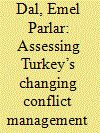

|
|
|
|
|
| Summary/Abstract |
This paper aims to shed light on Turkey’s conflict management role after the Cold War using a three-layered framework consisting of the layers of actorness, approaches and tools. In doing so, it seeks to profile Turkey’s international conflict management since the Cold War years with a special focus on the nature of its participation in conflict management as an active or passive actor, the perspectives from which it approaches conflict management, and the conflict management instruments it utilises. First, the paper will provide a conceptual framework of international conflict management based on the above-mentioned triad of actorness, approaches and tools as derived from the existing literature. Second, it will apply the selected three-layered analytical framework to Turkey to decipher its strengths and limitations in managing international conflicts.
|
|
|
|
|
|
|
|
|
|
|
|
|
|
|
|
| 2 |
ID:
151384
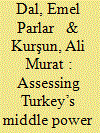

|
|
|
|
|
| Summary/Abstract |
This study attempts to identify possible new roles for intermediary actors in the changing global architecture by focusing on Turkey’s middle power capacity in the nascent middle power network of Mexico, Indonesia, South Korea, Turkey, Australia (MIKTA). It looks at an overarching embedded analytical triad of goals, means, and impact, superimposed over positional, behavioural, and ideational sublayers. It tests the assumption that the more a state holds together its middle power goals, means, and impact in a combined way, the more leverage it can have as a middle power in the changing international political economy. After reviewing the existing literature on middle powers, the first part of this paper outlines this embedded analytical framework. The second and the third parts seek to operationalize this framework, in particular at institutional and state levels in the example of MIKTA and Turkey. The fourth part delves into the opportunities and challenges that Turkey faces in its MIKTA trajectory (in the light of the conclusions drawn from the second and third parts). The study concludes that while Turkey possesses fairly compatible goals and impact with those of MIKTA, it is still far from channelling all of its capabilities to this new network due mainly to the domestic and regional impediments it faces—as well as the lack of a comprehensive roadmap in relation to MIKTA.
|
|
|
|
|
|
|
|
|
|
|
|
|
|
|
|
| 3 |
ID:
126677
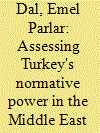

|
|
|
|
|
| Publication |
2013.
|
| Summary/Abstract |
In this study, the extent to which Turkey has been pursuing a normative foreign policy (NFP) toward the Arab revolts will be analyzed on the basis of Nathalie Tocci's description of a NFP actor, built on the following three conceptual tools: normative goals, normative means and normative results or impact. With a special emphasis on the conditioning factors that impacted Turkey's pursuit of an NFP, this paper also investigates the limitations and effectiveness of Turkey as an NFP actor in Middle East and North Africa (MENA) in order to understand if Turkey's role in the changing MENA region has gone beyond rhetoric to become empirically justified. It concludes that despite increasing normative representations and rhetoric in its foreign policy, Turkey does not currently possess a cohesive and ambitious NFP agenda and, thus, is still far from being a normative power.
|
|
|
|
|
|
|
|
|
|
|
|
|
|
|
|
| 4 |
ID:
146660
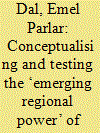

|
|
|
|
|
| Summary/Abstract |
Turkey has thus far been generally neglected in most IR studies on power categorisations, such as middle or middle-range power, regional power or rising/emerging power, despite its rising regional power status in the past decade. This paper attempts to understand Turkey’s regional power together with its rising power status using an integral approach. In doing so, it empirically tests whether or not Turkey fits Daniel Flemes’s ‘regional power’ category, which seems to be proposing a more complete and integral framework through the fulfilment of four basic preconditions: claim to leadership; possession of necessary power resources (material and ideational); employment of material, institutional and discursive foreign policy instruments; and acceptance of leadership by third parties. Based upon these analytical tools, the article will discuss Turkey’s performance in creating a regional impact in its neighbouring regions of the Middle East, the Balkans and the Black Sea and Caucasus.
|
|
|
|
|
|
|
|
|
|
|
|
|
|
|
|
| 5 |
ID:
126671
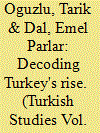

|
|
|
|
|
| Publication |
2013.
|
| Summary/Abstract |
Acknowledging Turkey as a rising power, and having commonalities in both objectives and outcomes with the other rising Southern powers, this study is a modest attempt to decode Turkey's rise with/within the West discursively and empirically and at multiple levels: systemic, regional and agent-based domestic. It aims to contribute to the debate over rising powers by developing new conceptualizations and challenging or reinterpreting the existing theoretical approaches in order to define Turkey's current power status vis-á-vis both other rising powers and the major Western powers. Turkey's recent rise, which has also been characterized by the country's high economic growth, must be nuanced from that of the Global South countries in some principal aspects. Unlike other rising powers, the Western factor weights more heavily in Turkey's recent rise. This issue's novel contribution to the existing literature on Turkish foreign policy is its attempt to understand Turkey's current rise, as well as its limitations in the context of its decades-long institutionalized and strategic relations with the West.
|
|
|
|
|
|
|
|
|
|
|
|
|
|
|
|
| 6 |
ID:
153883
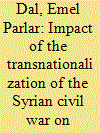

|
|
|
|
|
| Summary/Abstract |
This article examines how Turkey was affected by the conflict spillover effects of the Syrian civil war and its escalation in the last two years with the rise of the Islamic State in Iraq and Syria (ISIS) threat and the changing nature of the Kurdish insurgency. It seeks to assess the degree of the transnationalization of the Syrian civil war and its spread to Turkey by employing a theoretical framework borrowed from the conflict clustering literature. The first part will introduce the dual-embedded theoretical framework with its division of conflict spillover effects as “intentional” and “unintentional”. The second part tries to apply this dual-track framework to the Turkish case and, thus, seeks to test the conflict spillover factors on Turkey. The third part focuses on the two specific and major spillovers of the Syrian civil war, the ISIS threat and the rise of an embedded Kurdish insurgency, namely Democratic Union Party (PYD or Partiya Yekîtiya Demokrat)-Peoples Protection Units (Yekîneyên Parastina Gel or YPG)/Kurdistan Workers Party (Partiya Karkerên Kurdistanê or PKK), and explains the conflict spillover processes of these two case studies under a triple framework, origin, diffusion and escalation and with reference to the division between intentional and unintentional spillover effects.
|
|
|
|
|
|
|
|
|
|
|
|
|
|
|
|
| 7 |
ID:
140322
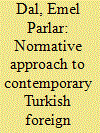

|
|
|
|
|
| Summary/Abstract |
This study explores the cosmopolitanism–communitarianism divide in normative international relations (IR) theory with a special focus on the apparent increasing weight of ethics and morality in Turkish foreign policy. First, it outlines the current debates in normative IR theory with a special focus on the divide between cosmopolitanism and communitarianism. Second, it asks whether Turkey’s foreign policy tradition, both in its discourse and its ethics, leans more toward cosmopolitanism or communitarianism. Then, it examines the slow rise of cosmopolitanism in Turkish foreign policy in the 2000s, with particular reference to the ruling political party in Turkey, the AKP (the Justice and Development Party). Finally, it examines the cosmopolitan/communitarian dilemma that the AKP government faces in the context of the Arab Spring, and specifically the Syrian civil war.
|
|
|
|
|
|
|
|
|
|
|
|
|
|
|
|
| 8 |
ID:
151379
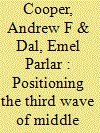

|
|
|
|
|
| Publication |
International Journal Vol: 71 No 4.
|
| Summary/Abstract |
This article argues that middle power diplomacy can be identified as having gone through three distinct waves. The first is connected with the immediate post-1945 global order, with a focus on multilateralism via the United Nations and related bodies. The second moved to ad hoc bursts of activism related to specific issue area niches. The third and current wave, by contrast, is embedded in the informal institutionalization associated with the G20. Just as the BRICS have used the G20 as a catalyst for differentiated activities both around and independent of the G20, the “missing middle” in the G20 (countries increasingly portrayed as middle powers beyond both the BRICS and the G7) have begun to explore the possibility of collective action. MIKTA (Mexico, Indonesia, Turkey, South Korea, and Australia), while possibly a significant advance in global governance, has the potential of hardening the categories of countries identified as middle powers. At the same time, the MIKTA countries face a number of serious constraints in terms of this global reach. Institutional elevation is compromised by practice limitations, most notably the hold of regional imperatives.
Keywords
|
|
|
|
|
|
|
|
|
|
|
|
|
|
|
|
| 9 |
ID:
132527


|
|
|
|
|
| Publication |
2014.
|
| Summary/Abstract |
This article aims to discuss and analyze the emergence and evolution of Turkey's role as a model in the international system in three different periods, 1991-93, 2003-05 and 2010-12. To this end, it methodologically uses the main concepts of role theory: role expectations, role conceptions and role performance. Focusing on K.J. Holsti's example national role conception category in particular, it seeks to reveal the major similarities and differences between the role expectations that have enacted the role conception known as the Turkish model, and compare the impact of these expectations on role performance in each of these three cases. The major argument of the article is that the sustainability of the model's national role conception depends foremost on Turkey's political and economic capabilities that directly influence its role performance.
|
|
|
|
|
|
|
|
|
|
|
|
|
|
|
|
| 10 |
ID:
163361


|
|
|
|
|
| Summary/Abstract |
This introductory article sheds light on commonalities and divergences in a selected group of rising powers’ (namely Brazil, India, China and Turkey) understanding and applications of conflict management and attempts to explain the priorities in their conflict management strategies from conceptual/theoretical and empirical aspects. The case studies in this special issue point to the evolving nature of conflict management policies of rising powers as a result of their changing priorities in foreign and security policy and the shifts observed in the international order since the end of the Cold War. The country specific perspectives provided in this issue have also proven right the potentialities of rising powers in managing conflicts, as well as their past and ongoing challenges in envisaging crises in both their own regions and extra-regional territories. The article begins by decoding the driving factors of rising powers’ conflict management strategies and their commonalities and divergences in peacebuilding policies. It then jumps into the theoretical and conceptual assessment of their conflict management approaches. In the third part, the issue delves into the evidence-based assessment their converging and differing conflict management policies depending on the nature of the conflict, its involving actors and its geographical location.
|
|
|
|
|
|
|
|
|
|
|
|
|
|
|
|
| 11 |
ID:
114242
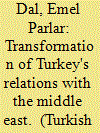

|
|
|
|
|
| Publication |
2012.
|
| Summary/Abstract |
In light of recent developments in the Middle East, in particular, the Arab revolts in the first few months of 2011 and the AKP's June 2011 election victory, this article aims to define the changing parameters of Turkey's new "Middle Eastern policy" under the AKP government, which is based on a new civilizational discourse and a differentiated geopolitical approach. It also discusses the basic dynamics and ideological and doctrinal background of Turkey's new Middle Eastern policy in order to understand the opportunities and constraints of its potential "facilitator and conciliator" role in the changing political circumstances of the region following the recent Arab uprisings. Despite the limits of Ankara's new civilizational and geopolitical orientation in both discourse and policy, which have at times undermined Turkey's neutrality on intra-Arab or Iranian-Arab axes and its facilitation role between Israel and its regional adversaries, Turkey's new regional posture for the Middle East represents an awakening rather than an illusion.
|
|
|
|
|
|
|
|
|
|
|
|
|
|
|
|
|
|
|
|
|